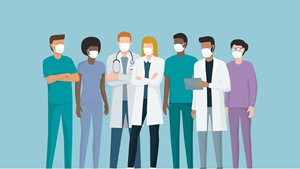
Every 40 seconds, someone in the United States suffers a heart attack and someone else has a stroke, according to the American Heart Association. But now, because of the fear of coronavirus, fewer people with heart attack or stroke symptoms are seeking medical help.
"Over the course of the last six to eight weeks, there are decreasing numbers of heart attacks and strokes showing up at U.S. hospitals,” said Dr. Robert Harrington, president of the American Heart Association.
Dr. Harrington recently co-published a statement noting that experts don’t believe there has been an actual drop in the number of heart attacks and strokes, but that those experiencing symptoms of these conditions are not seeking treatment due to coronavirus fears.
Rochester Regional Health Cardiologist Gerald Gacioch, MD, has a clear message for our community.
“If you’re having chest pains that last more than a few minutes, call 911. If you have stroke symptoms like weakness on one side, droopiness on the face, and trouble speaking, call 911. Don’t call your primary doctor first, don’t call your kids first, call 911.”
In an emergency heart or stroke situation, Rochester Regional Health hospitals are still the safest place for patients, explains Dr. Gacioch. Access to medical equipment and healthcare providers in a sterile and clean environment ensures that patients receive the best and safest care possible.
“If someone is having a heart attack, we can take them into the heart catheterization laboratory, and often within 20-25 minutes, they’ve stopped having a heart attack, and much of that heart muscle is saved,” said Dr. Gacioch.
The same goes for strokes. “If people have come in early, we can give them a clot-dissolving drug, or they can go to neuroradiologist who can pull the clot out of the brain.”
All Rochester Regional Health locations are following strict guidelines from the Center for Disease Control and Prevention (CDC) to ensure patients and healthcare workers are protected from any risk of the coronavirus.
“We’re wearing face masks and plastic face shields in the ER to protect our patients and staff,” said Dr. Gacioch. “Patients are being brought right into exam rooms and we’re following social distancing guidelines.”
Patients who have previously tested positive for COVID-19 are kept in separate areas of the hospital so there is little-to-no-chance of a heart or stroke patient coming in contact with someone with coronavirus.
“COVID-19 patients are in isolation. This idea that ER patients are at risk of getting infected is misguided.”
Rochester Regional Health has set up triage tents at Rochester General Hospital, Unity Hospital, United Memorial Medical Center, and Clifton Springs Hospital & Clinic for anyone experiencing COVID-19 symptoms. Providers at the tents are evaluating people for respiratory issues, providing various treatments like inhalers and nebulizers, and are serving as pre op testing for COVID-19 and MRSA. This further ensures coronavirus patients are not in the same shared areas as patients suffering from other health issues.
The American Heart Association advises that anyone who experiences heart attack warning signs—chest discomfort or discomfort in other areas of the body such as your arms, back, neck, jaw or stomach; shortness of breath; and other possible signs like breaking out in a cold sweat, nausea or lightheadedness—to call 911.
Anyone experiencing stroke symptoms should also call 911. Use the acronym FAST to remember stroke symptoms before they happen:
Learn more about our comprehensive stroke care
Dr. Gacioch cautions having a friend or spouse drive you to the hospital in an emergency. If something happens during transport, you don’t have the equipment that paramedics do to take care of it, he said.
“Our paramedics are some of the best in the country and are trained to deal with all kinds of situations that could arise on the way to the hospital. We have very strict protocols in place.”
Lastly, Dr. Gacioch reminds all patients with minor conditions to continue to stay at home and call your primary care provider to determine if you need to be seen in person or via telehealth.